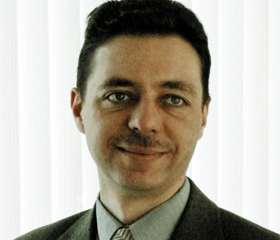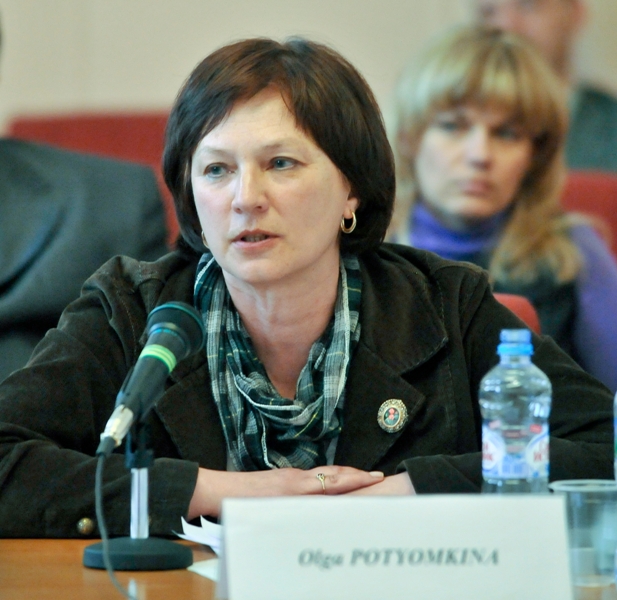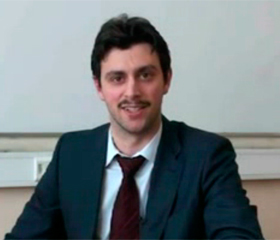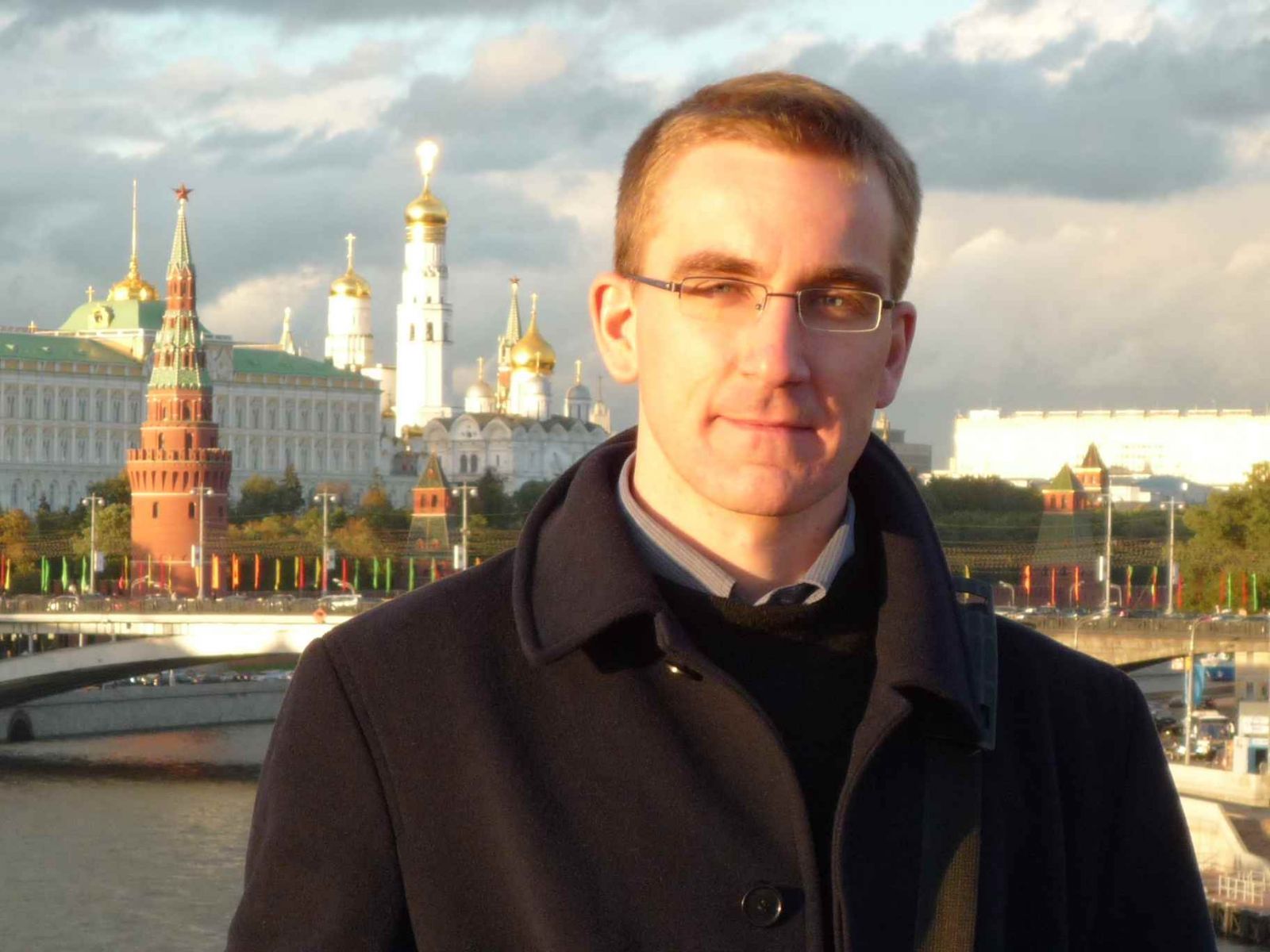The Future of Eastern Partnership
In
Login if you are already registered
(no votes) |
(0 votes) |
The Ukraine crisis has ruptured the talks on Eastern Partnership. We have met Vladislav Belov (RAS Institute for European Studies), Nikolay Kaveshnikov (MGIMO-University), Olga Potyomkina (RAS Institute for European Studies), Kyrill Entin (Higher School of Economics) and András Rácz (Peter Pazmany Catholic University, Hungary) who shared their views on the project's future, EU interests in Ukraine and prospects for Ukraine-Europe cooperation.
The Ukraine crisis has ruptured the talks on Eastern Partnership. We have met Vladislav Belov (RAS Institute for European Studies), Nikolay Kaveshnikov (MGIMO-University), Olga Potyomkina (RAS Institute for European Studies), Kyrill Entin (Higher School of Economics) and András Rácz (Peter Pazmany Catholic University, Hungary) who shared their views on the project's future, EU interests in Ukraine and prospects for Ukraine-Europe cooperation.
András Rácz: We are going to see a similar intensification of the European Union’s ‘Eastern policy’

Vladislav Belov: The increased anti-Russian rhetoric is likely to play a big role in inducing some countries to accept the European requirements under the new-look programme
Ph.D in Economics, Head of the Country and Regional Researches Department, Head of the German Research Center of the Institute for Europe, the Russian Academy of Sciences
In the coming weeks, the European Union will actively back the present Ukrainian government as part of its ‘anti-Crimea/anti-Russia’ position, insisting on the territorial integrity of the country. The political part of the Association Agreement will be signed in March–April. The European Union will start working on the economic part of the agreement after a new president is elected and after it assembles a new European Parliament and European Commission. It is impossible to predict when it will be signed. After the events of February–March both sides have to rethink the content of the agreement and reappraise its cost.
We can therefore expect further changes (things have already started moving) in the attitude of all the stakeholders to the Eastern Partnership programme and then changes to its content. Formally, it will probably remain in place, but the strategic goals, tasks and content will undergo considerable changes in which both the European Union and the post-Soviet participants are interested. Unfortunately, the increased anti-Russian rhetoric (which will be ratcheted up still more) is likely to play a big role in inducing some countries to accept the European requirements under the new-look programme. Considering the current political situation in Moldova (including the problem of Gagauzia’s autonomy), it is unclear whether the country will sign an association agreement this summer or not. Georgia does not have such problems now.
Germany, a political and economic heavyweight, will try to balance differing positions within the European Union and, together with its partners (notably France and Poland), look for ways to put new content into the Eastern Partnership and strengthen its influence in the area. Ukraine’s post-Yanukovych interests, as well as the new geopolitical situation in Eastern Europe, will play a key role here. German policymakers will have to find financial mechanisms that are effective, do not contradict the interests of other countries (for example in southern Europe), and are feasible in terms of monetary and fiscal stability. The issue is unlikely to be fiercely debated within the current government coalition or in the Bundestag (the Green and Left opposition has very little influence). German political functionaries will also conduct active negotiations with the interested countries while stressing their own neutrality.
There is guarded hope that the German political leadership will remember its recent proposals to give up the ‘either… or’ policy (made in connection with Ukraine), gradually overcome the anti-Russian syndrome that has been noticeable in recent days, and help involve Russia in the discussion of the new partnership and its possible consequences. Unfortunately, as of mid-March 2014, this is highly unlikely.

Nikolay Kaveshnikov: Western policymakers would do better to use their influence to persuade the forces that have come to power in Ukraine to start seeking a broad all-Ukrainian consensus on the future political structure of their country
Political Science PhD, Associate Professor, Head of Department of European integration at MGIMO-University, Leading Research Fellow at the RAS Institute of Europe
The destiny of Ukraine is determined by the profound heterogeneity of Ukrainian society. The cultural, linguistic and even economic differences between the country’s east and west contributed to the instability of its political system and fluctuations of its foreign policy. The immaturity of the country’s political elite has also played a fateful role. Instead of seeking a national consensus, every new administration adopted a ‘winner takes all’ mentality. For example, Viktor Yushchenko committed himself to getting Ukraine into NATO, against the wishes of half the Ukrainian people. President Yanukovych resorted to politically motivated criminal prosecution of Yulia Tymoshenko. The ‘political struggle’ aimed at destroying his opponent was waged against the background of deepening economic problems and mounting public dissatisfaction with corrupt politicians brandishing political slogans urging the population to ‘choose Europe’ or seek ‘unity with Russia’. The short-sighted actions of external forces also added momentum to the swinging of the ‘Ukrainian pendulum’. The false ‘Europe or Russia’ choice offered by the European Union further polarized Ukrainian society. Two alternative structures of the region were set against one another: the Eastern Partnership under the auspices of the European Union and the EurAsEC Customs Union. Russia could not remain an onlooker and managed to convince Yanukovych that signing the Association Agreement with the European Union was not good for Ukraine. Thereafter the crisis escalated, not least because Western countries supported the Maidan protesters in violation of all international norms.
What do we have today? The new Kiev ‘government’ has little legitimacy and is rejected by half of Ukraine’s population. In Crimea, there is open resistance and growing sentiments in favour of independence. In the eastern parts of the country, there is silent discontent and the (so far) small and (so far) peaceful protest actions against the Kiev authorities.
Riding the crest of the revolutionary wave extremists and even avowed fascists are making a bid for power. There are not many of them, but they command considerable influence on Maidan and on those who today call themselves the government of Ukraine. Against this backdrop, even establishment politicians are radicalized. On their first day in power the Maidan leaders repealed the law on the regional status of the Russian language, as if they did not have more pressing matters to attend to. Attempts are being made to integrate pro-fascist units into the law enforcement system. Most recently, political arrests were made as criminal proceedings were opened against governors and mayors in the east of the country.
All this happens at a time when state finances are in disarray and the economic crisis is obvious to everyone, when Ukraine’s Russian-speaking citizens are increasingly worried about their future in their home country and even fear for their lives.
Tensions have reached a dangerous level. The future of Ukraine as a state hangs in the balance. All this makes it incumbent upon the authorities in Kiev to offer an idea that could pacify the divided society. They alone, by their words and deeds, can initiative a broad national dialogue. They alone can start building a political system that is capable of uniting the Ukrainian people. Obviously, Ukraine should have a federal political system; because it is the only kind of system that can take into account the interests and positions of all the groups of Ukrainian population. The transformation of Ukraine into a federation would address the fears of those Russian-speaking citizens of Ukraine who today increasingly feel like aliens in their own country. Only federalization can dampen the separatist sentiments in the country.
Are the Kiev authorities ready to take such an approach? I am not so sure. The extremists are very dominant in the ranks of the ‘victors’. The euphoria generated by the toppling of Yanukovych is too great. In this situation, those who have real influence on the Kiev policymakers – the United States and the European Union – may play the key role, particularly the European Union. Up until now, the European Union’s unqualified support has only served to strengthen radical sentiments among the Kiev revolutionaries. European leaders must make up their minds whether they want to continue unequivocal support of the Kiev authorities, which include not only radical, but openly fascist elements. Is Europe ready to continue its unreserved support for people who have started prosecuting their political opponents and are creating an atmosphere of fear in the east of their own country? Is Europe ready to stand four-square behind people whose actions are fomenting separatist sentiments among large sections of Ukrainian citizens?
Western policymakers would do better to use their influence to persuade the forces that have come to power in Ukraine to start seeking a broad all-Ukrainian consensus on the future political structure of their country. Only this can alleviate the concerns that the Russian-speaking population for its safety, cultural identity and future within the Ukrainian state. Undoubtedly, once the consolidation of Ukrainian society begins, Europe and Russia should become involved in the process and work together to stabilize the political and economic situation in the country. Europe and Russia must work together to help the multinational Ukrainian people create a Ukraine that is not a bone of contention, but a bridge between two parts of the European continent.

Olga Potyomkina: The European Union reaffirmed its goal of strengthening economic integration and political association with the Eastern Partnership’s ‘promising’ members, Moldova and Georgia
Doctor of Political Science, Head of the Regional Research Department of Institute of Europe, Russian Academy of Science
The European Union spelled out its intentions regarding cooperation with Ukraine quite clearly in the conclusion and resolution of the European Parliament.
The European Union recognizes and supports the new Kiev government and looks forward to the results of the May 25 presidential elections, which it considers to be legitimate. Support for Ukraine has both political and financial-economic dimensions that are closely interconnected. The political part of the Association Agreement between Ukraine and the European Union will be signed as early as March 21. The signing of the economic part has been put on hold, which means that the European Union and Ukraine are aware of the possible consequences of that move for economic relations with Russia, that is, the new Kiev authorities will act in the same way as the previous Mykola Azarov government. Not to raise the controversial issue of a ‘deep and comprehensive’ free trade zone with Ukraine, the European Union has offered open access to its markets for Ukrainian goods unilaterally by implementing the Agreement’s section on tariffs and through stand-alone trade measures, such as temporarily cutting duties and introducing additional quotas for certain goods. At the same time the European Union has not given up its intention to include Ukraine in its Third Energy Package.
The IMF sets very tough conditions on its financial aid, demanding structural reforms which are sure to be unpopular. Ukraine has been promised further liberalization of the visa regime (after the Ukrainian government refused to sign the Association Agreement the European Union suspended talks on the matter and pointedly moved Moldova forward in the queue by promising its citizens short visa-free trips very soon).
By the same token the European Union reaffirmed its goal of strengthening economic integration and political association with the Eastern Partnership’s ‘promising’ members, Moldova and Georgia, by signing Association Agreements before the end of August 2014. However, Moldovan society is also divided over the issue of European integration and Romanianization of the country so that the outcome of that process will depend in many ways on the outcome of the Crimean referendum. The Commission has been speaking about ‘the prospect of European Union membership’ for Ukraine. But then the other associated countries may demand the same and the European Union will have to explain why it is Ukraine that deserved such a promise. Although the offer of European Union membership to Ukraine is unlikely, everything is possible given the political will and political expediency.

Kyrill Entin: If the Ukrainian government has ultra-right members, it would give the EU a convenient pretext for reneging on its promises to abolish visas and provide financial aid
Associate Professor, Center for Comprehensive European and International Studies of the Higher School of Economics, Higher School of Economics
The European Union’s decision to sign the political part of the Association Agreement without waiting for the elections and the full legitimization of the government is controversial to say the least. The development of cooperation will in many ways depend on the configuration of the future government and the far right’s exclusion from it. It is worth remembering that in 2000, when Jörg Haider’s ultra-right Austrian Freedom Party was offered a place in the Austrian government, the other European Union members suspended diplomatic contacts with the country for several months and even threatened to suspend its membership. If the Ukrainian government has ultra-right members, it would give the European Union a convenient pretext for reneging on its promises to abolish visas and provide financial aid.
On the other hand, the European Union has to be seen to firmly support the Yatsenyuk government now, even if it requires dividing the political and economic parts of the agreement – something that refused to Yanukovych. So the signing of the agreement can be seen as a logical continuation of the European Union’s ‘diplomatic sanctions’ against Russia because it too is intended to make the Russian integration projects less attractive.
The agreement lodges Ukraine firmly in the European Union’s political orbit. However, the attitude to Ukraine in Brussels has not changed: the European Union will continue to see it as a political buffer zone and an attractive market for its own goods and services. Ukraine ought to understand that the signing of the Association Agreement and the establishment of a free trade zone are not stepping stones to European Union membership; they are, to all intents and purposes, the final stop. The European Union cannot promise Ukraine membership even in the remote future. The latest events in Crimea and the east of the country, and the deteriorating economic situation in general may force the European Union to put on hold the idea of visa-free short trips for Ukrainian citizens.
From the very moment the Eastern Partnership was launched in 2009 it was obvious that the diverse assemblage of countries, limited finances and the lack of an effective institutional framework would make the project unfit for tackling any important tasks. Nevertheless, the Eastern Partnership has fulfilled its main mission by preparing Moldova, Georgia and Ukraine for singing association agreements. It is fair to assume that once this happens, the European Union will turn its attention to Armenia and Azerbaijan, and may even contemplate admitting further members. There is no point curtailing the project, which has been a success overall, if only as an instrument for exerting pressure on Russia.

András Rácz: We are going to see a similar intensification of the European Union’s ‘Eastern policy’
Associate Professor, Pázmány Péter Catholic University, Hungary *
(* The views and opinions of the author do not represent the official position of Pázmány Péter Catholic University)
How will the recent events impact the Eastern Partnership and relations between Ukraine and the EU?
In my opinion, in terms of the European Union’s ‘Eastern policy’ the current situation is reminiscent of what happened in September 2008. At that time, immediately after the August war in Georgia, the European Union decided not to become involved in a direct confrontation with Russia. Instead, the European Union decided to strengthen its relations with the six countries to the east, specifically Belarus, Ukraine, Moldova, Georgia, Armenia and Azerbaijan.
I think we are going to see a similar intensification of the European Union’s ‘Eastern policy’, including its relations with Ukraine. The new Ukrainian government is far more committed to close cooperation with the European Union than its predecessors. Most probably the Association Agreement with the European Union (AA) will be signed very soon. Even if the ratification will take some time, the political significance of the AA is hard to overestimate.
We have to bear in mind, of course, that the AA does not mean accession to the EU now or in the foreseeable future. All it means is closer trade and political cooperation.
The current situation differs in one important way from the one that followed the events of August 2008. This time around the European Union is set to confront Russia over the violation of the sovereignty and territorial integrity of Ukraine by Russian and pro-Russian forces in Crimea. Early steps have already been taken: negotiations on the easing of the visa regime have been suspended and specific sanctions and other measures may not be far behind. Thus, the European Union has sided with the Ukrainian government: both want to make it clear to Russia that armed violation of Ukraine’s sovereignty and territorial integrity is totally unacceptable.
What are the EU interests in Ukraine?
Apart from the obvious common cultural and historical heritage, the European Union has concrete political and economic interests in Ukraine. By far the most important interest is of course a stable and predictable political situation. Ukraine is an immediate neighbour of the European Union, so stability is key for the European Union. There may be different forms of stability, even an authoritarian system can be stable, but from the European Union’s point of view a stable and democratic state is better than a dictatorship. Democratic countries are better than authoritarian regimes at complying with the immutable requirements of the European Union concerning the rule of law, human rights and fundamental freedoms.
Solely in terms of stability, you could say that Ukrainian President Viktor Yanukovych was not a bad partner and the mass demonstrations and protests threatened that stability. Indeed, this was the view taken by a number of European Union countries, especially at the early stage of the protests. However, massive, large-scale and often indiscriminate and illegal use of force against the protesters was unacceptable for the European Union from the perspective of human rights and the rule of law.
In light of the unfortunate events of late, it has to be said openly that the European Union is obviously interested in the preservation of Ukraine’s sovereignty and territorial integrity and is likely to gradually implement a full range of political and economic measures to achieving these goals.
In addition to the political importance of stability, democratic development and respect for rights and basic freedoms, we cannot ignore the main economic interests of the European Union with regard to Ukraine. What we are talking about here is the safe transit of Russian oil and gas to Europe. The 2009 ‘gas crisis’ highlighted the damage that long interruptions of gas supply can cause. It is vital for the European Union to prevent another ‘gas war’ in its ‘Eastern neighbourhood’.
The European Union is also interest in the development of bilateral trade. The proposed ‘deep and comprehensive free-trade agreement’ is aimed at liberalizing trade between the European Union and Ukraine opening up promising trade opportunities for both sides. In addition to the known and competitive Ukrainian heavy industry products, we have to note the growing importance of Ukraine’s agriculture. With the continuing growth of world food prices, the boundless fertile lands of Ukraine and its food products may become an important strategic asset for the whole of Europe. Considering the overall importance of trade, it is necessary to persuade Ukrainians to choose ‘a deep and comprehensive free-trade agreement’ over the Russian-led Customs Union.
This in turn brings us to yet another important interest for the European Union, namely, the sweeping modernization of Ukraine in all spheres of life – social, educational and technological.
Furthermore, everyone is aware of the demographic problems in Western Europe whereby the population is simultaneously shrinking and aging. This spells the need for more labour. In the longer term closer cooperation with the European Union, including the easing of the visa regime (possibly even cancelling visas), will give Ukrainians broader access to the European Union labour market.
How might the situation in Ukraine develop and what will the consequences for the situation in the region be?
In terms of regional security, the situation is fraught with dire consequences. The Russian armed forces have grossly violated the territorial integrity of a sovereign independent state. Many Ukrainian military facilities in Crimea have been seized and the remaining ones have been blocked; and the number of Russian troops in Crimea is constantly growing. Besides, Russia has openly stated that it does not recognize the legitimacy of the Kiev government; thus Moscow does not feel bound by any agreements signed earlier with Ukraine.
Russia’s behaviour clearly threatens all the neighbouring countries, especially those with large Russian-speaking minorities or those that have their own and Russian-backed separatist conflicts. There are growing concerns in Moldova and Georgia as well as in Azerbaijan, Finland and the Baltic countries.
In the medium term the growing Russian threat is likely to prompt the non-NATO countries in the greater Black Sea region to seek more powerful protectors and beef up their own defence potential. As a result, we are likely to see a new wave of rearmament in the Black Sea region and perhaps in other regions close to Russia.
As for the longer term, Russia has caused serious damage to its image. Instead of acting as a predictable great power and a responsible actor in world politics, Russia is now behaving like a ‘loose cannon’ causing huge damage not only to Ukraine, but to itself as well.
The prestige and credibility of Russian diplomacy have been undermined by its inconsistent actions during the crisis. A case in point is the patently false declarations that the forces in Crimea were not Russian (I wish I could see the shop where, according to President Putin, thousands (!) of Russian military uniforms could be bought, along with cruisers, armoured vehicles and helicopter gunships…). Another instance is what Moscow calls the free expression of the will of the Crimean population to be separated from Ukraine: does it mean that Russia has suddenly recognized Kosovo?
The Crimean conflict has seriously damaged relations between Russia and the European Union and between Russia and NATO. Moscow looks set to isolate itself from the West. Needless to say, the aggression against Ukraine has actually negated any prestige earned by the near-perfect staging of the Sochi Olympic Games: all the tens of billions of roubles poured into this PR project have been wasted. As a result, the conflict will in future have negative consequences for all the parties involved, including Russia, Ukraine, the West and also the Black Sea countries.
That is why it is necessary to put an end to all this, and the sooner the better. The March 16 referendum in Crimea, even if it fails to be recognized by any international players, may allow Russia to save face. If the results show that the majority of the people in Crimea are against secession, Russia could use this as grounds for removing its troops from the peninsula – especially if the Kiev authorities evince a readiness to offer credible guarantees for the rights of all the ethnic minorities in Ukraine. If the troops are withdrawn, the reputational damage would be less than the political and economic costs of a long and drawn-out conflict, not to speak of the danger of a sudden military escalation that nobody wants to see.
The interview was conducted on 11 Match 2014.
Interviewed by Daria Khaspekova, RIAC Program Coordinator and Maria Gurova, RIAC Program Assistant.
(no votes) |
(0 votes) |



